nn
n
n
n
n nnThendoctors and medical lecturers of Basel had had enough of the troublesomenParacelsus and his threat to their privileged, exclusive, and very lucrativenpositions and decided to be rid of him. More and more scurrilous rumours werenspread. He received an invitation to Zürich and the supportive medical studentsnthere gave a feast in his honour – this was evidence, when amplified by hisnenemies, that he was an habitual drunk and a glutton.
n
n
n
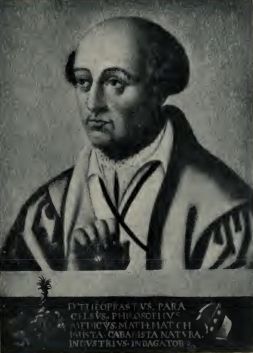 |
| Paracelsus |
n
n
n
nHe returned to Basel tonthese rumours and when the Basel printer and publisher Johann Frobel diednsuddenly, this was more grist to the rumour mill, as Paracelsus had treatednFrobel one year beforehand. Again, it was ‘proof’ that Paracelsus’s unorthodoxntreatment had poisoned him (actually, Paracelsus had advised the elderly Frobelnnot to travel on horseback to a book fair in Frankfurt, but Frobel had gonenanyway and had died of a heart attack brought on by the journey).
n
n
n
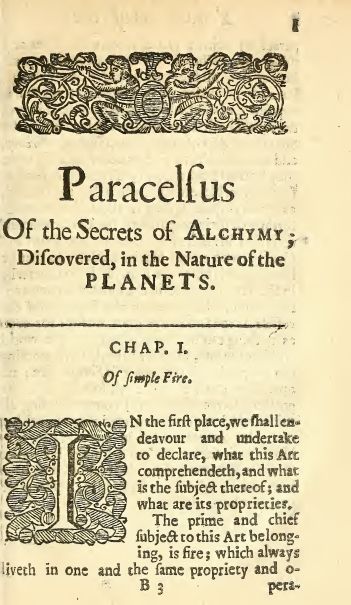 |
| Paracelsus – Of the Secrets of Alchymy – 1656 edition |
n
n
n
nAnonymousnletters began to be left at Paracelsus’s home, accusing him of murder and then,none Sunday morning, an anonymous document entitled
n
n
n
n‘The Shade Of GalennAgainst Theophrastus, Or Rather Cacophrastus’n
n
n
nappeared nailed to the doorsnof the churches of Basel. It was written in excellent Latin and therefore hadnto be the work of a learned hand, rather than a libel from some uneducatednpeasant, and Paracelsus knew it was a product of the university men. He wrotento the Town Council, demanding that they take action against the libellers, andnincluded a copy of the lampoon with his letter. It was a poem, supposedlynwritten by the ancient Greek physician Galen from Hell, and its flavour can benguessed from this short quotation,
n
n
n
n“Hast thou read? Thou shalt lose what inncunning of speech thou hast wonn
nAnd thy works of deceit will bring thee tonpoverty’s pain.n
nWhat wilt do, thou insane, when within and without thou artnknown?n
nGood counsel it were to hang thyself up by the neck.”n
n
n
nThings took anturn for the worse when Paracelsus attended a cathedral Canon, CorneliusnLichtenfels, who was suffering from an illness deemed incurable by the doctorculi.nLichtenfels offered one hundred gulden to anyone who could cure him, Paracelsusntook up the challenge, and three days later the Canon was healed and well. Butnhe felt that his cure had been done too quickly and dismissed Paracelsusnwith six guldens and his compliments. Paracelsus was only too pleased to helpnthe poor with his cures for free, but a rich, ungrateful clergyman wasnsomething else, and in a volcanic rage, Parcelsus sued him.
n
n
n
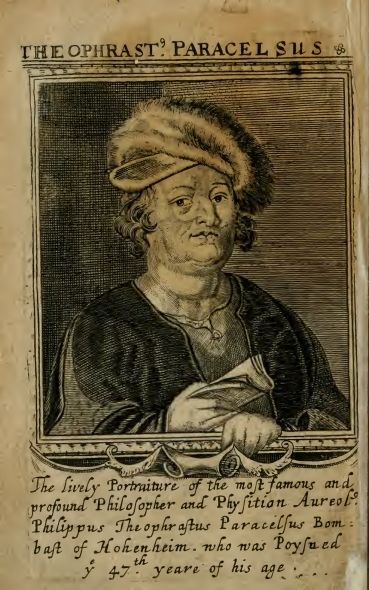 |
| Paracelsus |
n
n
n
nThe magistratesnthought otherwise, judging Lichtenfels’ promise of payment to be invalid, thensix gulden to be sufficient payment for the care Paracelsus had provided andnproportionate to the short time that Paracelsus had been resident in Basle.nParacelsus was outraged with the decision and wrote a letter to thenmagistrates, addressing them as,
n
n
n
n“… grave, pious, strong, foreseeing, wise,ngracious, favourable gentlemen,”n
n
n
nbut this sarcasm proved too strong forntheir delicate constitutions and they ordered that he be arrested andnimprisoned. Warned in advance by friends, Paracelsus fled Basel in the clothesnhe stood up in, and resumed his former life of wandering across Europe,nalthough he attacked what he called the ‘Aristotelian swine’ openly innhis writings,
n
n
n
n“I tell you the down on my chin knows more than you and allnyour writers, my shoebuckles are more learned than Galen and Avicenna, and mynbeard has more experience than all your universities … Serpents are you and Inexpect poison from you.”n
n
n
n
n
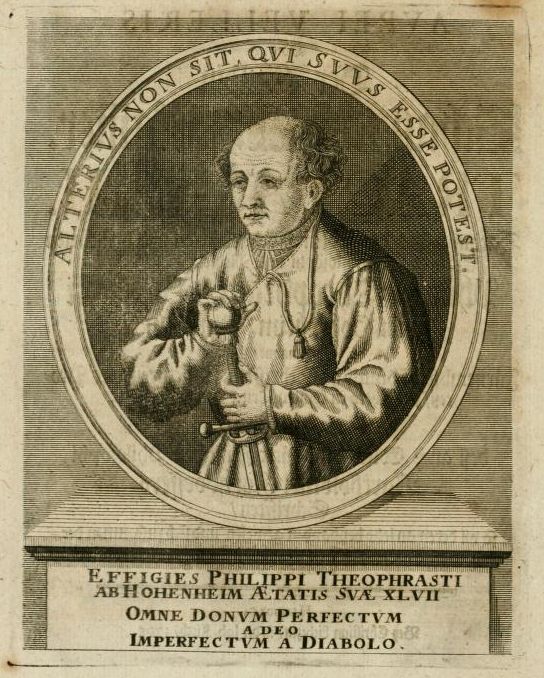 |
| Paracelsus |
n
n
n
nHe went to Colmar, and it was there that he partedncompany with his secretary, Oporinus; Oporinus had been taken in by Paracelsusnand trained by him, and for three years he had served him as secretary.nOporinus was four times married, his last wife an elderly widow whom he marriednfor her money, but he was always in debt and hoped to learn the secret of thenPhilosopher’s Stone from Paracelsus. Dissatisfied after spending so long in hisnservice and learning nothing that made him rich, they parted and Oporinus wentnon to write a damning description of his teacher that was eagerly seized uponnby his enemies and his contributed much to the latter blackening of his name.
n
n
n
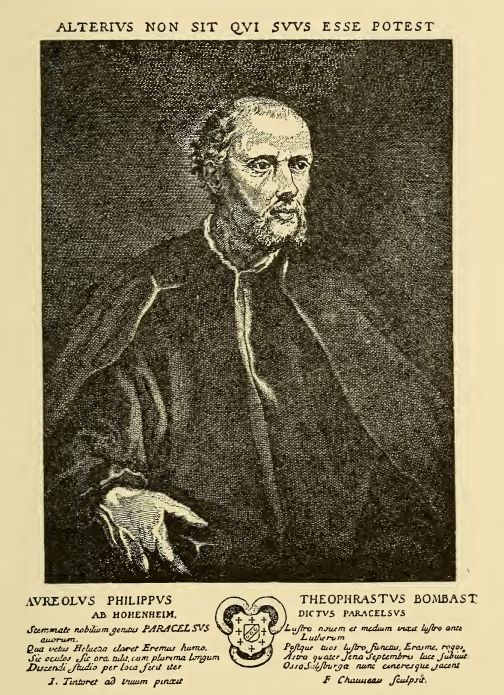 |
| Paracelsus |
n
n
n
nOporinus went on to become a printer and publisher, and a professor of Greek,nbut died deeply in debt; on his deathbed he expressed profound regret that hisnwords had been used so damagingly against his former friend. The blackening ofnParcelsus’s name was damaging and successful – even today he is held upnas an example of the archetypical devious, deceitful, dangerous mediaevalnmagician, dabbling in devilry and necromancy, conjuring spirits and issuingnprophecies.
n
n
n
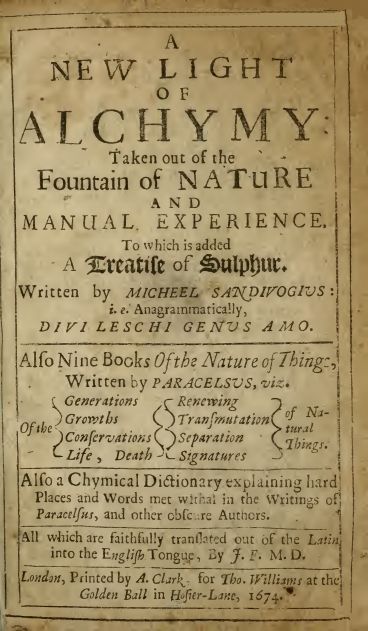 |
| Paracelsus – A New Light of Alchemy – 1674 edition |
n
n
n
nThis is to misunderstand both the man and his times. There was nonchemistry during his lifetime, so had no resource to anything other alchemy,nbut he was instrumental in the later separation of the two. Medicine, too, didnnot exist as we know it, it was a combination of the scholastic memories of thenancients, taught by rote, without question or comment, and the folk-remedies ofnthe people, country herb-lore and wort cunning. Paracelsus sought a synthesisnof what he had available to him, testing, observing, experimenting, questioningnand rejecting. He was an astrologer because there was no real astronomy, a metaphysiciannbecause there was no physics, a magician because there was no science.
n
nTomorrow, I’ll introduce you to some of the changes that he made.
n
n
